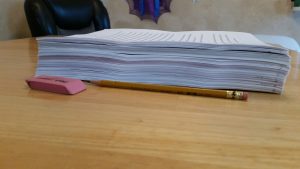I am finally getting back to writing. Not drafting right now, but revising something I have been putting off. Sometimes revision is clear and straightforward. In fact, I usually prefer revising to drafting. But this time the revisions are difficult—muddy.
In theory, I know what to do. Among other things, I am shoring up the “goals” in my protagonist’s scenes. Making clear what she wants. Because the feedback I got was that her goal got muddy after the first few chapters and therefore the reader lost interest in all the confusion.
So I have sharpened in my mind the overall story goal—the one that drove her from the beginning. But I am having trouble bringing that goal to the surface in all the scenes, because sometimes the scene goal necessarily overshadows the book goal. When you’ve been imprisoned and tortured, the immediate goals of survival and escape take precedence over all else. So maybe I have the wrong story goal altogether and that’s why I’m having so much trouble with it. And sometimes what the character thinks they want and what they actually need are not the same. And sometimes what they want changes over time. So I’m slogging along but not sure I’m making the story any better—I may be muddying it further.
The second part of the revision is my struggle with the Points of View (POV). I have 3 POV characters—but have been told that I should lose two of them. One is the villain (an adult), and the advice I got is that adult POVs have no place in YA. Unfortunately for me, I love this villain and find her very interesting, so it’s killing me to lose her POV. I also need to find a way to get some info that only that character knows into the story so the reader can know it, too.
I disagree with losing the second POV, as it is the twin brother of the main character. The genre is also space opera, which by its nature has a large canvas and usually needs more than one POV to tell the complete story. So I am trying to tie his POV closer to the main character’s to make his POV more relevant, as well as trying to find other ways to tell his part of the story that may involve the main character.
Again, not sure if I am helping or muddying at this point.
I’ll just push through the mud and then take a look at the finished whole and see what I think. I’m not totally happy with the way the revisions are going, but that doesn’t necessarily mean they’re not actually going well. It’s just that right now there’s so much mud I can’t find the solid ground underneath.
So, fellow scribes, how do you know if your revision is making your story better or worse?


Writing Chiropractic: Making Adjustments to Your Flow
I see a chiropractor every couple of weeks. I admit to being skeptical at first, but thought I would try it. While he has not been able to fix everything on me, his adjustments have eliminated ling-standing hip pain, lessened both the frequency and length of chronic headaches, and gave me almost instant relief from excruciating hip pain from an injury. So adjustments have helped me immensely.
The basic premise of chiropractic care is to keep our spines aligned to allow for proper signal flow along the nerves. Misalignment in the spine (and elsewhere) can block the flow, causing pain or other malfunctions. So an adjustment will remove blockages and allow for proper body functioning.
We need to make such adjustments to our writing process from time to time, as well. Our writing process isn’t stagnant, and as we evolve as writers we need to adjust it. Our stories become more complex, the demands of our daily lives change, and what worked before may no longer work now. So we need to take a step back and look at our process, and see where we can remove blockages to get our productivity flowing again.
On a project level, we need to do the same with our stories. Does the flow work? The pacing, the character arc, the plot, must all flow together. If any one if those elements (or others like word-level rhythm) is blocked, the story doesn’t work smoothly and the reader loses interest. Revision provides us with the opportunity to make adjustments that make our prose glow.
Obviously there is no such thing as a writing chiropractor. So where do we go to find someone who can help us make the necessary adjustments? We can hire editors, use beta readers, critique groups, or critique partners. The feedback from any of these people can help us remove the blockages that are keeping our story from flowing properly.